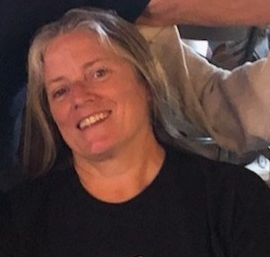From a front-row seat on January 31, I observed two well-known lawyers sparring in the executive council chamber. It was Warmington and Formella, and the heated dialogue begins at 1h21 min in this video.
Most people paying attention to the Corner Office race know that reproductive issues primarily fuel Warmington’s campaign, and she lashed out at Formella because he declined to join an amicus brief with his out-of-state counterparts. He took it like a gentleman at the mic for about 10 minutes, claiming that it didn’t pass legal muster while she was gaslighting him.
That was not the first time Warmington became unhinged in the chamber. A previous time, a date unknown to me at the moment, she spent about 30 minutes lashing out at Wheeler for recording his vote. As the “leader of the pack,” so to speak, one of Wheeler’s responsibilities is to deliver the meeting minutes to Scanlan’s office to be archived. Warmington took objection to Wheeler recording his vote on voice votes. It was a “wah wah wah, transparency” cry to no avail while Wheeler defended himself, claiming that he always does that. She claimed that he was taking advantage of the benefits of being the messenger.
There’s other fodder to make criticism of Warmington, but instead, let’s discuss the kinds of votes there are and their applications. While I’m most certainly a Wheeler critic, I commend him for recording his vote in a VOICE VOTE, which is resoundingly transparent. A future researcher who pays little or no attention to what’s happening today has a shovel to start digging if desired.
The VOICE VOTE is used in lots of government bodies, including the executive council and both chambers of the legislature, usually to move things along and/or when the item being voted on is of little interest or consequence. In addition to saving time, there are a few other advantages. One of them is the subjectivity of the person running the show. Look at the Senate, for example. No matter how loud you hear the enemy camp shout “no” with D’Allesandro playing lead vocals, Jeb can still say, “The ayes have it, and the item is adopted.” So it’s a great “power tool” in the toolbox, but it also cloaks cowardice, and the cowards have an easier time dodging accountability in a larger body, particularly the House.
All kinds of shenanigans can and do happen when an item of specific interest, like brass knuckles, falls victim to the establishment’s hive mind. I mention brass knuckles because that bill was in the Senate last year. Twitley moved the item right after the clerk called on her to introduce the committee recommendation just to usurp any opportunity for discussion, and a VOICE VOTE was involved. Remember that this is a body of 24; one could ask each one how they voted, but there’s no individual recording and archiving of said votes.
Let’s revisit the executive council, which only has five members. What I just said about the Senate applies here also, hence Wheeler’s desire to record his vote. Then there’s the roll call. Roll calls are time-consuming, especially when there are a lot of them. In the House, all 400, or as Senator Gray would say, “members with butts in seats,” which is often much less than 400, will press their buttons during that window of time to vote. It goes ON RECORD, both how they voted or if they voted at all. Accountability.
Before leaving Twitter, I used to follow Eric Brakey, the good senator from Maine who was blocked by Buckley.
One of his videos showed the Maine Senate voting just like the NH House. They have 35 members.
We have 24, and the clerk calls the roll, one at a time. Pay attention to the dynamics here. Carrie Gendreau will always vote first and Altschiller will always vote last. This is the same for the executive council. Kenney will always vote first, and Wheeler will always vote last. In a body of 5, Wheeler has the opportunity to be a tiebreaker if one of his peers has already gone rogue with a vote. The flip side is that Wheeler’s vote is rendered irrelevant if Kenney, Stevens, and Gatsas vote the same way.
Why am I boring you with all this civics? It’s because the executive council has to vote on the judge nomination of the Gunstock accomplice, aka Belknap County Attorney Andrew Livernois. Remember that this is a political favor from His Excellency for Livernois’s contribution to torpedoing NH’s reddest county. If you’re not up to speed on Gunstock, which the Damn Emperor prefers you not be, you can find intel here.
I emailed Wheeler shortly after Livernois’s January 31 nomination, which was at the same meeting as Warmington’s most recent public meltdown.
At the end of the email, I said, “Please vote NO and encourage your peers to do the same.” I published the open letter as a model for those with writer’s block, but personalizing an email to one’s elected is known to have a better chance of being read than copied and pasted activist group emails. As voter number five in a ROLL CALL VOTE, Wheeler’s vote can potentially become irrelevant as I already noted. He can’t block Livernois all by himself; therefore, it is important to get at least 2 of his peers on board. Kenney, who always votes first and was the lone dissenter against the approval of Anne Edwards’s judge appointment, would be a good person to target. Kenney also recently made some public comments about wanting more “big government” in the form of snowmobile regulation on the heels of recent accidents involving rentals.
Politely point out that he is on notice.
Have you told YOUR executive councilor to vote NO yet? If not, please do it now. I suggest pointing out that it’s an election year. Now it’s time to go follow up on Wheeler, who has a habit of ignoring my emails.

